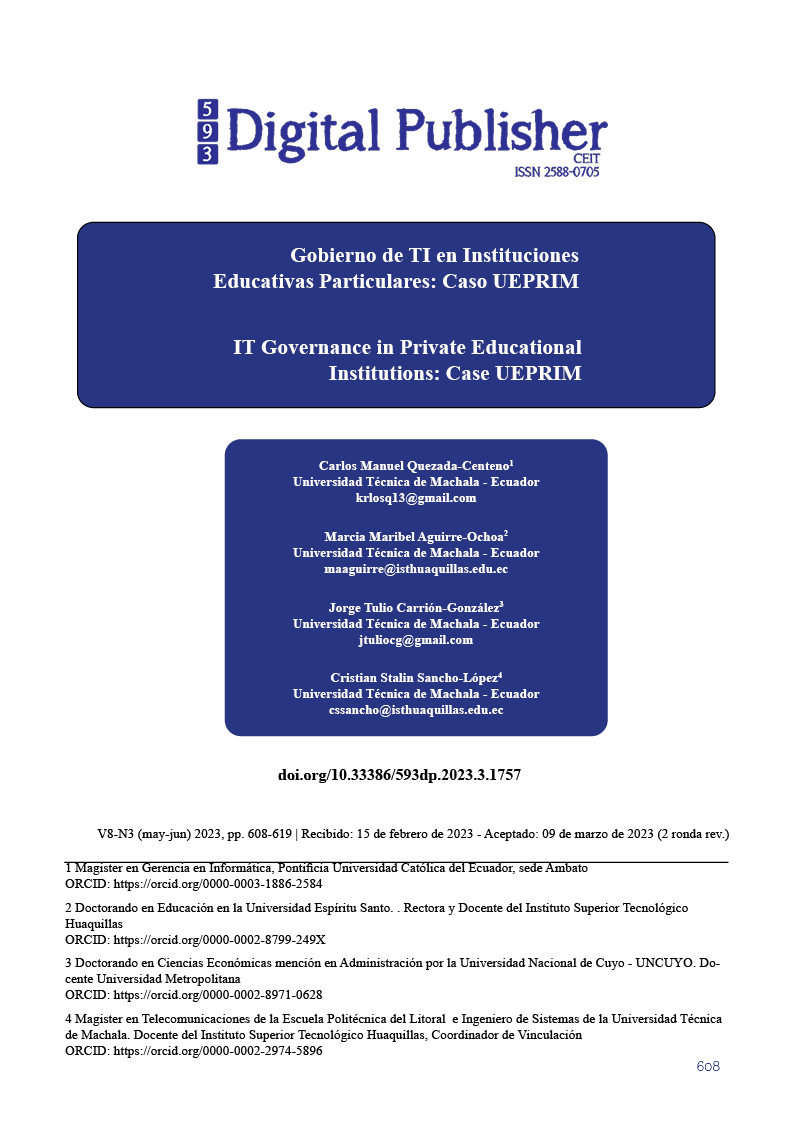IT Governance in Private Educational Institutions: Case UEPRIM
Main Article Content
Abstract
The research focuses on the development of Information Technology (IT) Governance in educational institutions, with emphasis on the efficient management of technological resources and processes. The methodology consisted of a bibliographic review of the IEC/ISO 38500 and ITIL V3 standards. It includes a stage of diagnosis of the governance and applicability of the principles and tasks of the IEC/ISO 38500 standard, a second stage of review of the ITIL phases, a third stage of implementation of processes and practices suggested by the standard and the model, and finally continuous improvement. Processes with very low weighting were identified as requiring improvement focus. An example of this is the service operation process in the ITIL process review section, which is essential for the organization to execute and deliver services effectively and efficiently. In the first assessment, this process obtained a GAP analysis of 0.8. After applying the proposed solutions and re-evaluating it, a significant improvement in the process was observed, reaching a 2.5 in the GAP analysis.
By evaluating the governance of the IT management, through the ISO/IEC 38500 standard, it was possible to align the IT department's strategy with the institutional strategy; likewise, by evaluating all the ITIL phases, it was possible to establish the critical points in the services provided by the IT department, which served as a starting point for the continuous improvement process.
Downloads
Article Details

This work is licensed under a Creative Commons Attribution-NonCommercial-ShareAlike 4.0 International License.
1. Derechos de autor
Las obras que se publican en 593 Digital Publisher CEIT están sujetas a los siguientes términos:
1.1. 593 Digital Publisher CEIT, conserva los derechos patrimoniales (copyright) de las obras publicadas, favorece y permite la reutilización de las mismas bajo la licencia Licencia Creative Commons 4.0 de Reconocimiento-NoComercial-CompartirIgual 4.0, por lo cual se pueden copiar, usar, difundir, transmitir y exponer públicamente, siempre que:
1.1.a. Se cite la autoría y fuente original de su publicación (revista, editorial, URL).
1.1.b. No se usen para fines comerciales u onerosos.
1.1.c. Se mencione la existencia y especificaciones de esta licencia de uso.
References
A. Chaudhuri, «Enabling Effective IT governance: leveraging ISO/IEC 38500:2008 and COBIT to achieve COBIT to achieve business–IT alignment,» The EDP Audit, Control, and Security Newsletter, vol. 44, nº 2, pp. 1-18, 2011.
Bosch, A. (2011, agosto). Cáp 8. Herramientas para la implantación del gobierno de las TI: ISO 38500, Madrid, España.
Lozano Sandobal, F., & Rodriguez Mejía, K. (2011). Biblioteca Digital ICESI. Recuperado el 1 de Mayo de 2015, de https://repository.icesi.edu.co/biblioteca_digital/bitstream/10906/68000/1/modelo_implementacion_universitaria.pdf
Caneo, P. (2013, agosto). GOBIERNO DE TI - Para obtener el mayor valor de las Tecnologías de Información. Gerencia. Recuperado de http://www.emb.cl/gerencia/articulo.mvc?xid=3261&sec=14
Urbina, G. B., Soto, P. F., & Gonzaga, E. A. (2014). Curso de Consultoría TIC. Gestión, Software ERP y CRM: 2ª Edición. Grupo Editorial Patria.
Lozano y Utreras, (2014). Diseño de un marco referencial de Gobierno de ti basado en Cobit para Instituciones Educativas k-12 radicadas en el Ecuador. Disponible en: http://dspace.udla.edu.ec/handle/33000/1837
R. E. Putri y K. Surendro, «A Process Capability Assessment Model of IT Governance Based on ISO 38500,» IEEE, pp. 1-6, 2015.
ISO/IEC, «ISO/IEC 38500: Tecnología de la información - Gobierno de TI para la organización,» ISO/IEC, Suiza, 2015.
Liao, Z., Lu, Y., & Rui, O. (2019). The impact of customer satisfaction on customer loyalty: A meta-analysis of design, measurement, and moderation factors. Journal of Business Research, 98, 365-382.
Paraskevas, A., Kyriakidis, M., & Siskos, Y. (2020). The impact of service and product quality on customer satisfaction and loyalty: A meta-analysis. Journal of Business Research, 117, 384-396.
Raza, S., Raza, S. R., & Khan, M. I. (2018). Impact of service quality and customer satisfaction on customer loyalty: An empirical investigation. Journal of Retailing and Consumer Services, 40, 1-13.
Wang, Y., Wang, Y., & Chen, Y. (2019). The impact of emerging technologies on business performance: A meta-analysis. Journal of Business Research, 98, 365-382.
Goyal, S., & Goyal, S. (2019). Technology as a key factor in international expansion of firms. Journal of International Business Studies, 50(1), 1-19.
Gao, Q., Wu, J., & Sun, Y. (2018). Impact of process automation on firm efficiency: Evidence from Chinese manufacturing firms. Journal of Business Research, 85, 79-88.
UEPRIM, (2015). Código de convivencia. Recuperado de http://www.ueprim.edu.ec/files/CODIGO CONVIVENCIA.pdf





